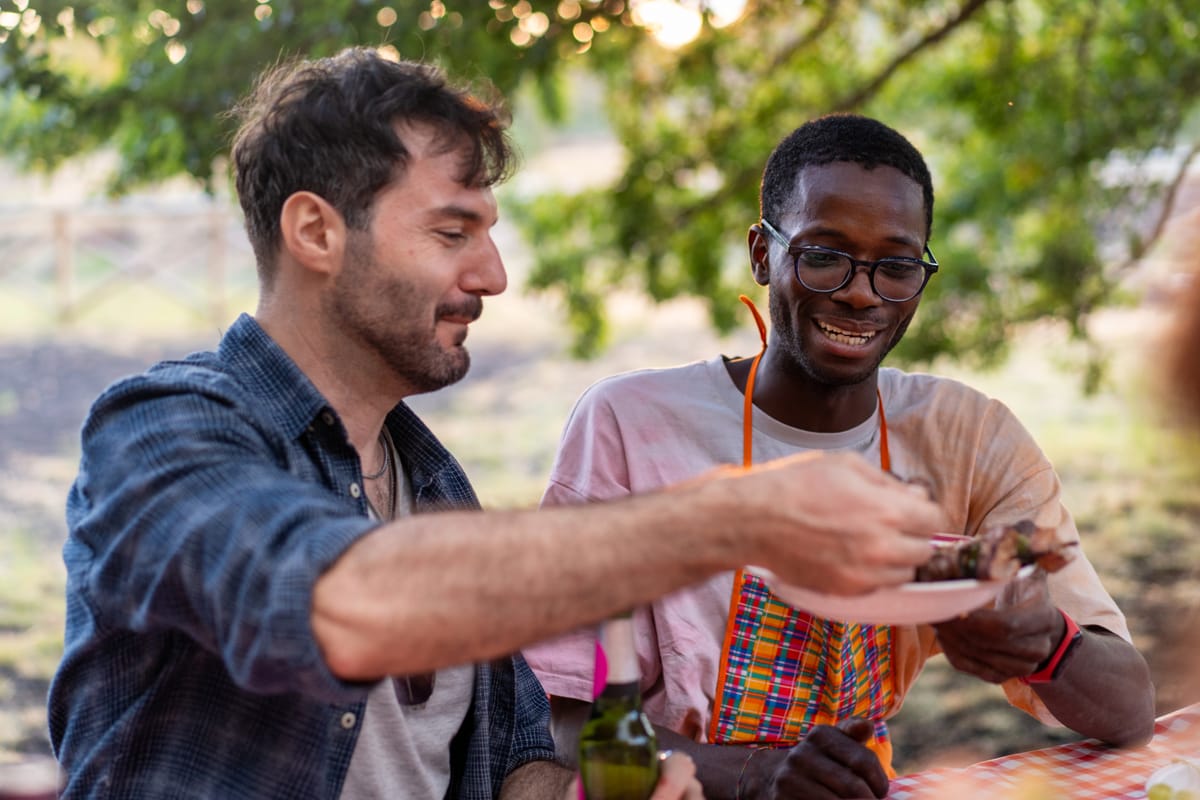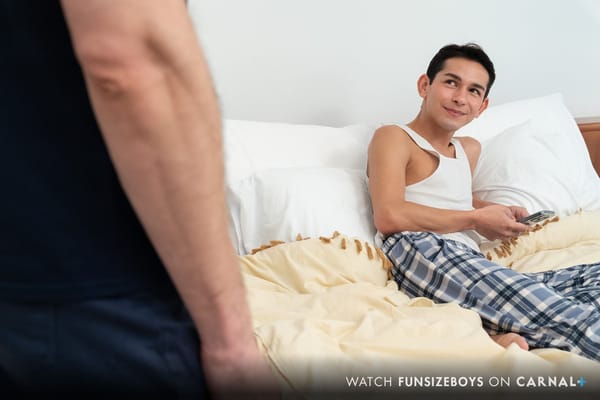How to eat
Emiliano Pena explains how there's more to the health benefits of food than just what we put in our mouths.

For our podcast, How To Date Men, we caught up with London-based dietician, Emiliano Pena, to discuss how what we eat influences how we feel.
In the conversation, we talk diet, nutrition, and the power of eating together.
The connection between food and health is a fairly obvious one, but you recently wrote an article that explored how what we eat influences how we feel. Why was this something that you wanted to focus on?
I think it all started when I was a little kid and I used to help my mom in the kitchen. I would always be there in the kitchen, chopping stuff, seeing recipes and everything. I developed a deep connection with food.
Through my Mexican background, where we celebrate food, being together and everything - like many other cultures - I always felt food had this special power to connect people.
I then went on to do research - first as a neuroscientist, then as a dietician - and I worked with clients and patients.
So there's the connection part and the science part, and it felt worthwhile to put all of this together and share this knowledge with people.
In the article, you do talk about some of the benefits of specific nutrients - such as omega-3s and antioxidants - but what you're really getting at is that how we eat is almost just as important as what we eat. Can you talk a little bit about what you mean by that?
Of course what we eat is important because that's where we get our nutrients. We could talk for a long time about what a balanced diet looks like - that's definitely the foundation. But how you eat and who you eat with can also be as important because if you take the time to enjoy your meals, connect with the food - the experiences, emotions, and memories it evokes - that helps you connect with yourself, and it increases your well-being.
When you share a meal with other people, you get added value because you're not only feeding yourself but you're also feeling a connection. We're social animals - our brains love making connections, our souls love making connections, so that all contributes to our well-being.
So, healthy eating can be seen as a combination of those three factors - eating a balanced diet, connecting with the food you're eating, and connecting with others through eating together.
Intuitively that makes sense, but you're saying that there's research available that actually puts some science behind that as well?
There is research - not only related to food but also looking generally at social interaction.
For example, studies show an association between social interation and a reduced risk of developing dementia - social interaction keeps different areas of our brain active.
We can also see that a feeling of community and connection helps to reduce things like stress and anxiety.
When you combine social interaction with food, that's a great combination.
Are you saying that all of our mental health issues could be resolved if we just made some changes to what we're eating and - more importantly - how we're eating?
The short answer is no. But how and what you eat can definitely support your mental health.
Nutrients such as fibre can be turned into specific compounds that then have beneficial effects on your brain, on your body, and your immune system.
Sharing meals can contribute to reducing anxiety, depression, and stress.
Food is not a silver bullet but it's definitely a strong foundation that can make a difference.
What are some of the practical steps that we could take to rethink what we're eating and how we're eating?
The first thing would be just being mindful. I know it's kind of a cliché, but just enjoy the moment when you're having your meal. If it's sharing a meal with somebody, even better.
Enjoying the moment can be as simple as paying attention to what you're eating, how you're eating - the textures, smells, the colours - taking your time to enjoy your meal.
Ideally, no multitasking, Focus on the meal - put the phone down, don't eat in front of a screen.
You're hosting a series of food events in London that explore some of these themes that you're talking about. How do these events connect with what you're advocating about food and health?
It's a group of men sharing healthy recipes that contribute to a balanced diet.
Everybody contributes to the preparation of the meal and then we eat together.
My aim is to create a kind of community that then can create bonds and contribute to well-being through healthy eating.
Is it a cooking class or group therapy or both of those things?
You could call it cooking therapy, perhaps?
We cook together, we talk about everything, we share everything we've done together, we talk about different things - that sense of community and sense of belonging is very important, especially in big cities such as London where sometimes it can feel a bit not necessarily lonely but dispersive. There's so many distractions, and everything is always hectic.
I feel that creating these kinds of spaces and events can help us to slow down, connect with yourself and connect with others through food.
Even if you don't describe it as loneliness, the way that we live creates a sense of isolation, of disconnection. But how do I eat with someone if I live by myself or I'm in a house share or I'm having lunch at my desk at work? So an event such as this is a way of enabling people to come together in an informal, low-stakes, low-investment kind of way?
Absolutely. You don't necessarily need to eat with people every time you have a meal but sharing a meal creates opportunities to build a sense of connection - laughing, sharing stories, sharing feelings.
The events that I'm organising are one way for people to share a meal and be part of our community.
What sort of food are you cooking at these events?
These are easy-to-prepare meals from all around the world.
For example, the thought of making pasta from scratch might seem a bit overwhelming, but once you get into it you soon realise that it's not difficult at all.
We make gnocchi, tortillas and tacos, falafel, sushi rolls - all of those things.
We're demonstrating the variety of healthy meals that you can prepare from cultures all around the world, putting those on the table, showing people that this is actually not as complicated as you might have thought. We're also sharing the experience - supporting each other, encouraging each other, and eating together.
How big are these events? How many people are involved in the cooking and the eating?
I would like to involve as many people as possible for the logistics of an event create some limitations. So far, we've found that 8-10 people seems to be a good number.
Even though you're saying, it would be great to host as many people as possible - in a bigger group, it can be a bit overwhelming, particularly if you're someone who's a bit introverted or has a bit of social anxiety. If there's 50 people, it can be a bit harder to navigate than if there's 10 people?
Definitely. The bigger the group, the more difficult it is to have those kind of deeper interactions - you can't spend that much time with every single person if you have like 50 people, right?
If you have 10 people you can interact with everyone and everyone can be part of the conversation at the table. If you're more than 10 people, then you just start having smaller groups and then that kind of dissolves the efficacy of the community approach.
It's effectively family-style eating, isn't it? Where everyone sits around the table and you talk about your day and you argue about things. When you live by yourself or you're in a share-house, you rarely get to sit down with a group of people and have a group conversation in that way?
Exactly. I think that's the magic behind these events - the combination of cooking, eating, and community. It's a very nourishing experience in every sense of the word.
How do people find out about when the next food events are?
All the details will be on my website.
If someone was wanting to make some positive changes to their diet, but wasn't sure how to go about it, what advice or guidance would you give them?
One of the stepping stones would be to have a look at the Eat Well Guide, which contains a very visual summary of the eating recommendations in the UK.
Secondly, be kind and compassionate with yourself in the sense that you don't need to get it perfect from the very beginning because it could feel overwhelming. Start with one thing.
Another very important thing is hydration. Hydration is very important to maintain your focus and your performance.
Be mindful about what you're putting on your plate, what you're putting in your body.
Look for opportunities to share a meal with others.
You're not alone in this journey. If you need some guidance, reach out to qualified healthcare professionals - registered dieticians, like myself, or registered nutritionists. There are lots of qualified professionals out there that will be happy to help you and support you.
Do you provide individual support or consultations with people about their diet and what and how they're eating?
As a registered dietician, I do offer one-to-one consultations. Every person is different, so everything revolves around the client, their goals, what they want to achieve.
The NSFW edition
If you want to admire some man-on-man action, our NSFW edition gives you every inch.
Sign in and check out our NSFW content - it's free!










